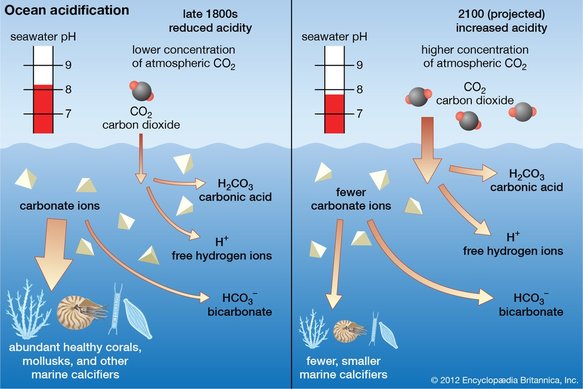As a coral biologist, I'm concerned with how amore acidic ocean will lead to the dissolution of coral reef architecture--the coral and the myriad of calcifying invertebrates that reside on reefs, as well as the sand and limestone that form the foundation of reefs. However, a more acidic sea can also reduce the SPEED at which calcified organism build their skeletons. This is because, like all things, we are at a constant fight against degradation, breakdown, entropy. As an animal builds its skeleton it is also slowly losing parts of its skeleton to processes of erosion--some biological (boring animals like sponges and gastropods), others physical (wave action, abrasion, breaking off). So, in order for animals and reefs to GROW, there must be a positive balance where growth (accretion) exceeds loss (erosion). Therefore, OA reducing this positive balance reduces the net calcified growth of an organism and in essence, they may be smaller for longer and not build skeletons as quickly. Finally, once the animal is dead and ceases to grow all together, more acidic conditions can lead to fast dissolution of the calcified material all together.
|
|
|
Changing ocean chemistry can affect coral reefs, but it can also affect commercial crops like mussels, oysters, and clams. Many *human* coastal communities across the world depend on resources from the sea. Decreases in yield or quality of products (smaller oysters, let's say) will hurt these communities, and therefore OA is not solely a tropical reef problem, but a global problem with implications at virtually every scale of marine life.
Finally, I saw this blog this week from Rice University describing ocean acidification (OA). It is pretty nice, showing both the chemical basis of OA and some of the impacts OA can have on biological organisms.
When Air Meets Water: Carbon Dioxide And Ocean Acidification
For those wanting to get more information, the US National Oceanic and Atmospheric Administration is a worldwide authority. You can view real data from ocean monitoring stations and learn everything about OA from chemistry to biological and socio-economic impacts of OA
Learn about Ocean Acidification and OA research at NOAA and the NOAA PMEL Carbon Program


 RSS Feed
RSS Feed